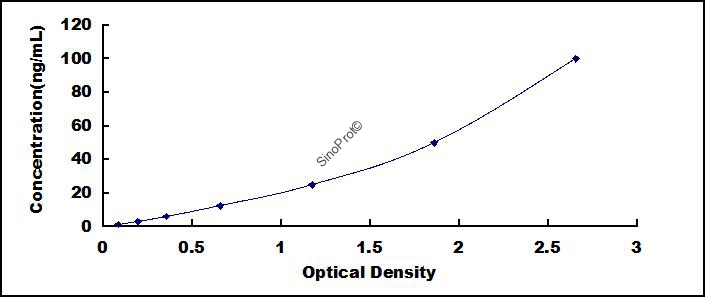ELISA kit for Mus musculus (Mouse) Selenoprotein P1, Plasma (SEPP1)
SEPP; SeP; SEP-P1; SELP
- 96T (KEV032Mu) US$ 684
Description: Selenoprotein P1, Plasma (SEPP1)
Organism Species: Mus musculus (Mouse)
Sample Type: serum, plasma and other biological fluids
Test Method: Double-antibody Sandwich
Assay Length: 3h
Detection Range: 1.56-100ng/mL
Sensitivity: The minimum detectable dose of this kit is typically less than 0.59ng/mL.
Specifity: This assay has high sensitivity and excellent specificity for detection of Selenoprotein P1, Plasma (SEPP1). No significant cross-reactivity or interference between Selenoprotein P1, Plasma (SEPP1) and analogues was observed.
Typical Standard Curve:

Stability: The stability of kit is determined by the loss rate of activity. The loss rate of this kit is less than 5% within the expiration date under appropriate storage condition. To minimize extra influence on the performance, operation procedures and lab conditions, especially room temperature, air humidity, incubator temperature should be strictly controlled. It is also strongly suggested that the whole assay is performed by the same operator from the beginning to the end.
Storage: Store at 4°C for frequent use. Stored at -20°C in a manual defrost freezer for one year without detectable loss of activity. Avoid repeated freeze-thaw cycles.
Notes: For In vitro laboratory use only. Not for any clinical, therapeutic, or diagnostic use in humans or animals. Not for animal or human consumption.
Recovery
Matrices listed below were spiked with certain level of recombinant Selenoprotein P1, Plasma (SEPP1) and the recovery rates were calculated by comparing the measured value to the expected amount of Selenoprotein P1, Plasma (SEPP1) in samples.
| Matrix | Recovery range (%) | Average(%) |
| serum(n=5) | 80-96 | 87 |
| EDTA plasma(n=5) | 77-97 | 91 |
| heparin plasma(n=5) | 78-97 | 89 |
Precision
Intra-assay Precision (Precision within an assay): 3 samples with low, middle and high level Selenoprotein P1, Plasma (SEPP1) were tested 24 times on one plate, respectively.
Inter-assay Precision (Precision between assays): 3 samples with low, middle and high level Selenoprotein P1, Plasma (SEPP1) were tested on 3 different plates, 8 replicates in each plate.
CV(%) = SD/meanX100
Intra-Assay: CV<10%
Inter-Assay: CV<12%
Linearity
The linearity of the kit was assayed by testing samples spiked with appropriate concentration of Selenoprotein P1, Plasma (SEPP1) and their serial dilutions. The results were demonstrated by the percentage of calculated concentration to the expected.
| Sample | 1:2 | 1:4 | 1:8 | 1:16 |
| serum(n=5) | 93%-100% | 96-102% | 99-104% | 99-106% |
| EDTA plasma(n=5) | 90-102% | 94-102% | 83-91% | 90-93% |
| heparin plasma(n=5) | 96-105% | 84-95% | 97-97% | 86-103% |
Reagents and materials provided
| Reagents | Quantity | Reagents | Quantity |
|---|---|---|---|
| Pre-coated, ready to use 96-well strip plate | 1 | Plate sealer for 96 wells | 4 |
| Standard | 2 | Standard Diluent | 1×20mL |
| Detection Reagent A | 1×120µL | Assay Diluent A | 1×12mL |
| Detection Reagent B | 1×120µL | Assay Diluent B | 1×12mL |
| TMB Substrate | 1×9mL | Stop Solution | 1×6mL |
| Wash Buffer (30 × concentrate) | 1×20mL | Instruction manual | 1 |
Assay procedure summary
1. Prepare all reagents, samples and standards;
2. Add 100µL standard or sample to each well. Incubate 1 hours at 37°C;
3. Aspirate and add 100µL prepared Detection Reagent A. Incubate 1 hour at 37°C;
4. Aspirate and wash 3 times;
5. Add 100µL prepared Detection Reagent B. Incubate 30 minutes at 37°C;
6. Aspirate and wash 5 times;
7. Add 90µL Substrate Solution. Incubate 10-20 minutes at 37°C;
8. Add 50µL Stop Solution. Read at 450nm immediately.
Test principle
The test principle applied in this kit is Sandwich enzyme immunoassay. The microtiter plate provided in this kit has been pre-coated with an antibody specific to Selenoprotein P1, Plasma (SEPP1). Standards or samples are then added to the appropriate microtiter plate wells with a biotin-conjugated antibody specific to Selenoprotein P1, Plasma (SEPP1). Next, Avidin conjugated to Horseradish Peroxidase (HRP) is added to each microplate well and incubated. After TMB substrate solution is added, only those wells that contain Selenoprotein P1, Plasma (SEPP1), biotin-conjugated antibody and enzyme-conjugated Avidin will exhibit a change in color. The enzyme-substrate reaction is terminated by the addition of sulphuric acid solution and the color change is measured spectrophotometrically at a wavelength of 450nm ± 10nm. The concentration of Selenoprotein P1, Plasma (SEPP1) in the samples is then determined by comparing the O.D. of the samples to the standard curve.
